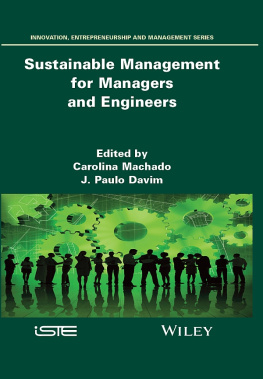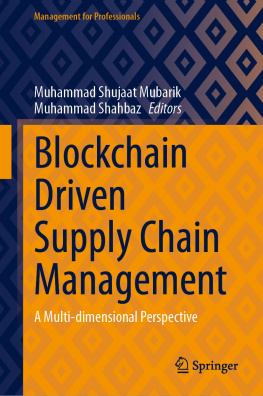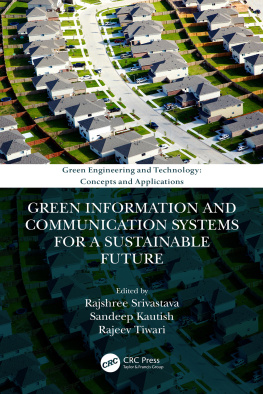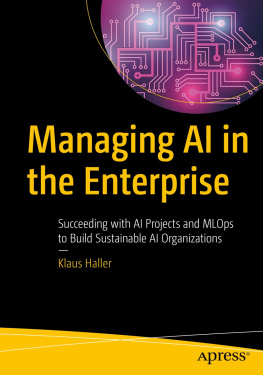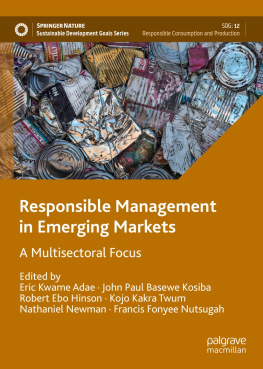First published 2020 in Great Britain and the United States by ISTE Ltd and John Wiley & Sons, Inc.
Apart from any fair dealing for the purposes of research or private study, or criticism or review, as permitted under the Copyright, Designs and Patents Act 1988, this publication may only be reproduced, stored or transmitted, in any form or by any means, with the prior permission in writing of the publishers, or in the case of reprographic reproduction in accordance with the terms and licenses issued by the CLA. Enquiries concerning reproduction outside these terms should be sent to the publishers at the undermentioned address:
John Wiley & Sons, Inc.
The rights of Carolina Feliciana Machado and J. Paulo Davim to be identified as the authors of this work have been asserted by them in accordance with the Copyright, Designs and Patents Act 1988.
Preface
Based on two main concepts sustainability and management Sustainable Management is understood as the application of sustainable practices in different areas, namely business, the environment, society as a whole, as well as in daily life, and managing them in order to benefit both current and future generations. With the possibility of being applied to all aspects of our lives, sustainable management is critical as it is seen as the ability to successfully maintain the quality of life on our planet.
In a competitive and complex world where requirements from the different fields are ever increasing, organizations need to be responsible for their actions in the markets in which they operate. However, this responsibility cannot be seen as a one-time action but as a continuous process, under which organizations ought to use the different resources effectively, that will answer to the present and future requirements of the different stakeholders. Indeed, if from one side the organization influences the market, from the other side, the market understood in its different perspectives, economic, social, environmental, political also influences the organization. As a result of the interaction between the organization and the market, in order to be effective, the organization needs to think and act in a sustainable way. Occupying critical positions within the organizational structure, with a significant influence on their collaborators performances, the role developed by managers and engineers is highly relevant in the sustainable success of the organization.
Taking into account these concerns, and giving particular attention to the needs of managers and engineers as they look to develop sustainable management able to answer to the present and future needs of the organization this book covers the issues related to sustainable management in a context where organizations are, increasingly, facing deep challenges such as the need to introduce recycling and repurposing practices, waste reduction, lower cost and more timely production, add value, as well as develop sustainable behaviors. Nowadays organizational activities should be managed under strategic and sustainable policies.
Conscious of this reality, this book contributes to the exchange of experiences and perspectives about the state of the research related to sustainable management, with a particular focus in the role that needs to be developed by managers and engineers, as well as the future direction of this field of research. The content provides support to academics and researchers, as well as to those operating in the management field who need to deal with policies and strategies related to sustainable management issues.
Organized in nine chapters, this book covers the following: draws a distinction, Stop Camouflaging it in Green: Do Not Confuse Corporate Social Responsibility with Sustainable Management.
The mission of this book is to provide a channel of communication to disseminate knowledge of how to manage in an environment where concerns around sustainable management present a challenge, among academics/researchers, managers and engineers.
In other words, in order to be used by academics, researchers, human resources managers, managers, engineers, and other professionals in related matters, this book looks to:
- share knowledge about sustainable management through debate and information exchange;
- find out how organizations around the world are defining and implementing their sustainable management strategies;
- keep at the forefront of innovative theories and the latest research activity related to sustainable management;
- participate in an international, interdisciplinary exchange of information, ideas and opinions about the new challenges and changes in the sustainable management field.
The editors acknowledge their gratitude to ISTE-Wiley for this opportunity and for their professional support. Finally, we would like to thank all the chapter authors for their interest and availability to work on this project.
Carolina Feliciana MACHADO
Braga, Portugal
J. Paulo DAVIM
Aveiro, Portugal
September 2020
Choice Architecture: Nudging for Sustainable Behavior
Sustainable management demands an in-depth understanding of current global economic, social and environmental pressures. This chapter deals with the use of choice architecture and its potential to influence decision-making. It focuses primarily on the discussion of how nudges influence choice, their applications to design interventions to promote behavioral change, and the challenges and ethical concerns to individuals freedom of choice.
1.1. Choice architecture and nudging
1.1.1. Choice architecture
People are becoming more concerned about the impact of their choices and are increasingly motivated to engage in sustainable behavior. Being environmentally sensitive in consumption, making healthy choices, and changing troublesome habits are critical to individual and societal well-being.
Choice architecture refers to the context or environment in which people make choices. Behavioral science has come to realize that the way in which options are presented can have a significant impact on the option that is chosen, and that small changes in the decision environment may influence the decision-making process.
People make countless choices in daily life, including decisions on how to use money, time, effort and attention. As individuals face a wide range of possible choices, have limited cognitive resources, and need quick decisions, they use heuristics to facilitate routine choices. Heuristics are shortcuts or rules of thumb that simplify and facilitate decisions. They are not bad per se but do not always produce the best outcomes. Frequently, they produce systematic biases in thinking and judgment that generate expected mistakes and postponement of complex decisions. For instance, in terms of formal logic, having more options should always be better than having fewer options. Nevertheless, due to limitations of time, attention and self-control, individuals often feel overloaded when given too many options. They may perceive having more options as worse than having fewer options, when, rationally, adding more options should always be better. Indeed, people do not have time, motivation, or attention to carefully and consciously think about every decision. For instance, research has shown that we make more than 200 daily food-related decisions [WAN 07]. In general, habits and impulses govern our decisions without awareness. Nudging overcomes this problem by recognizing that choice architecture has a huge impact on the decision-making process and that small changes in that process may generate better outcomes. Small changes, such as organizing the way the food is displayed in cafeterias, where healthy food is made more visible, contribute to healthier choices.

